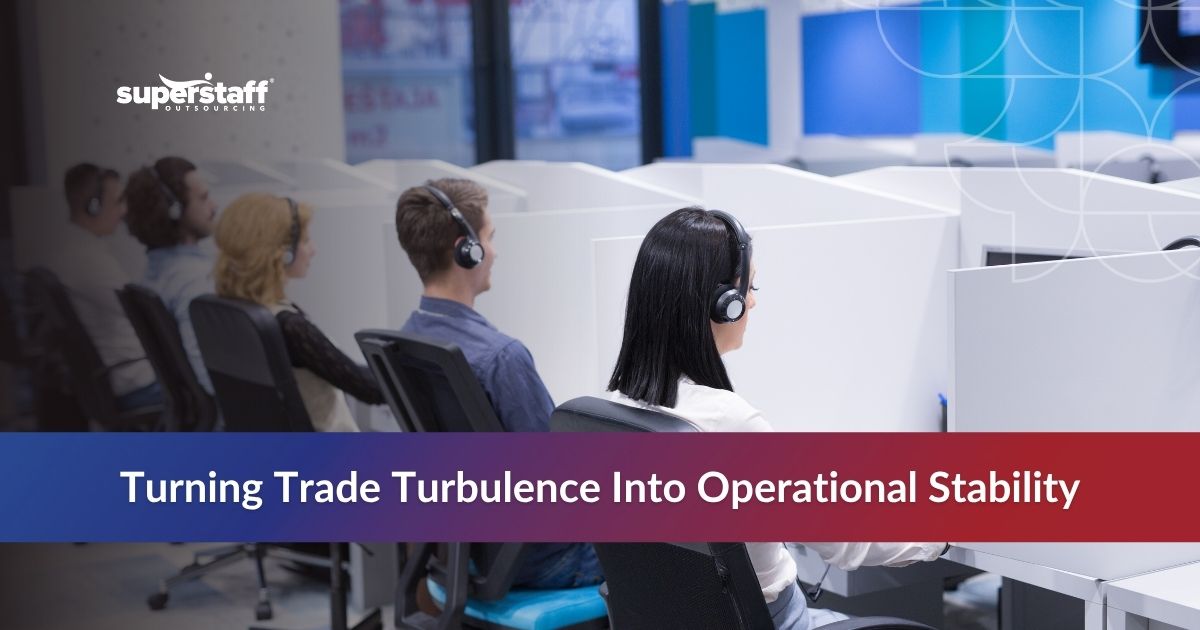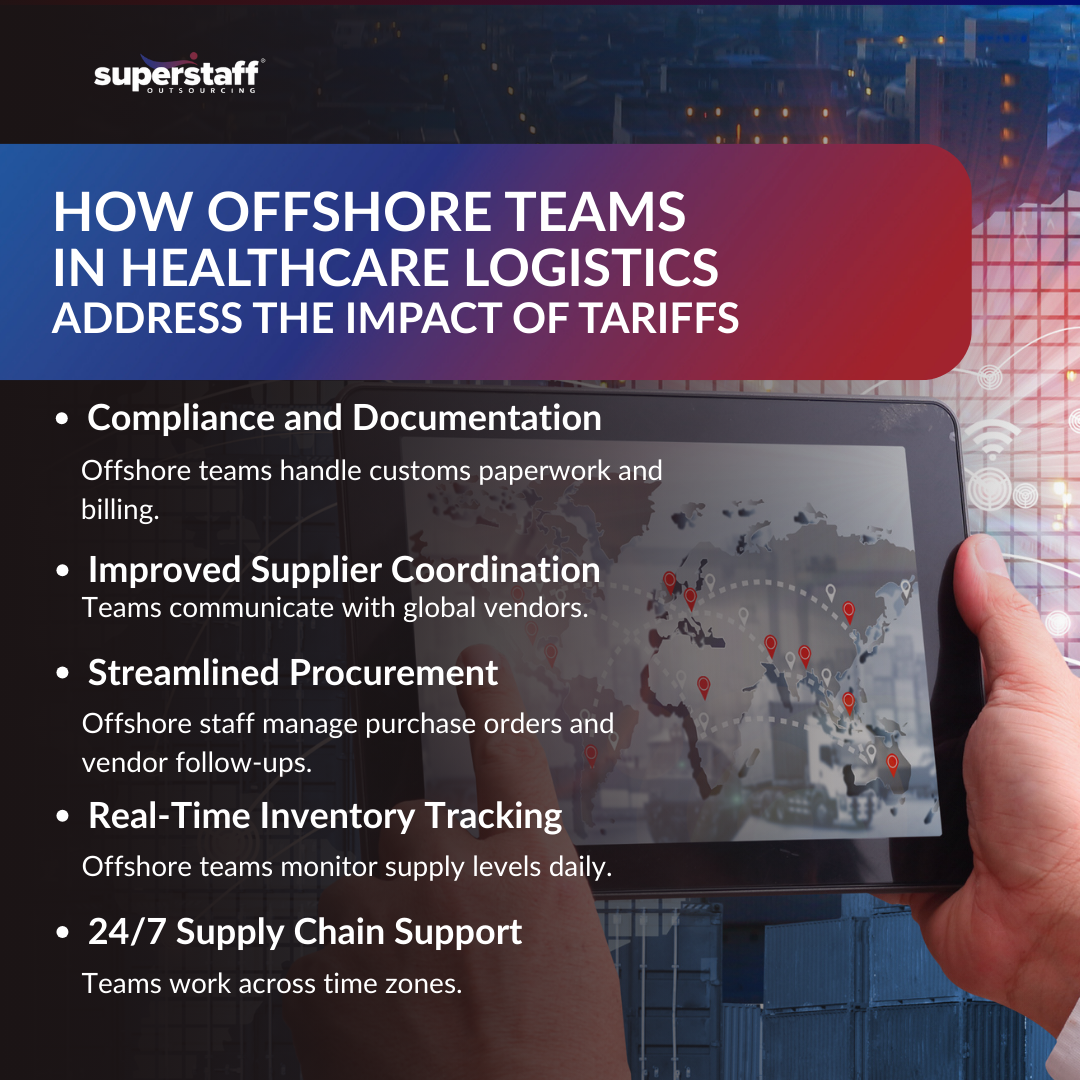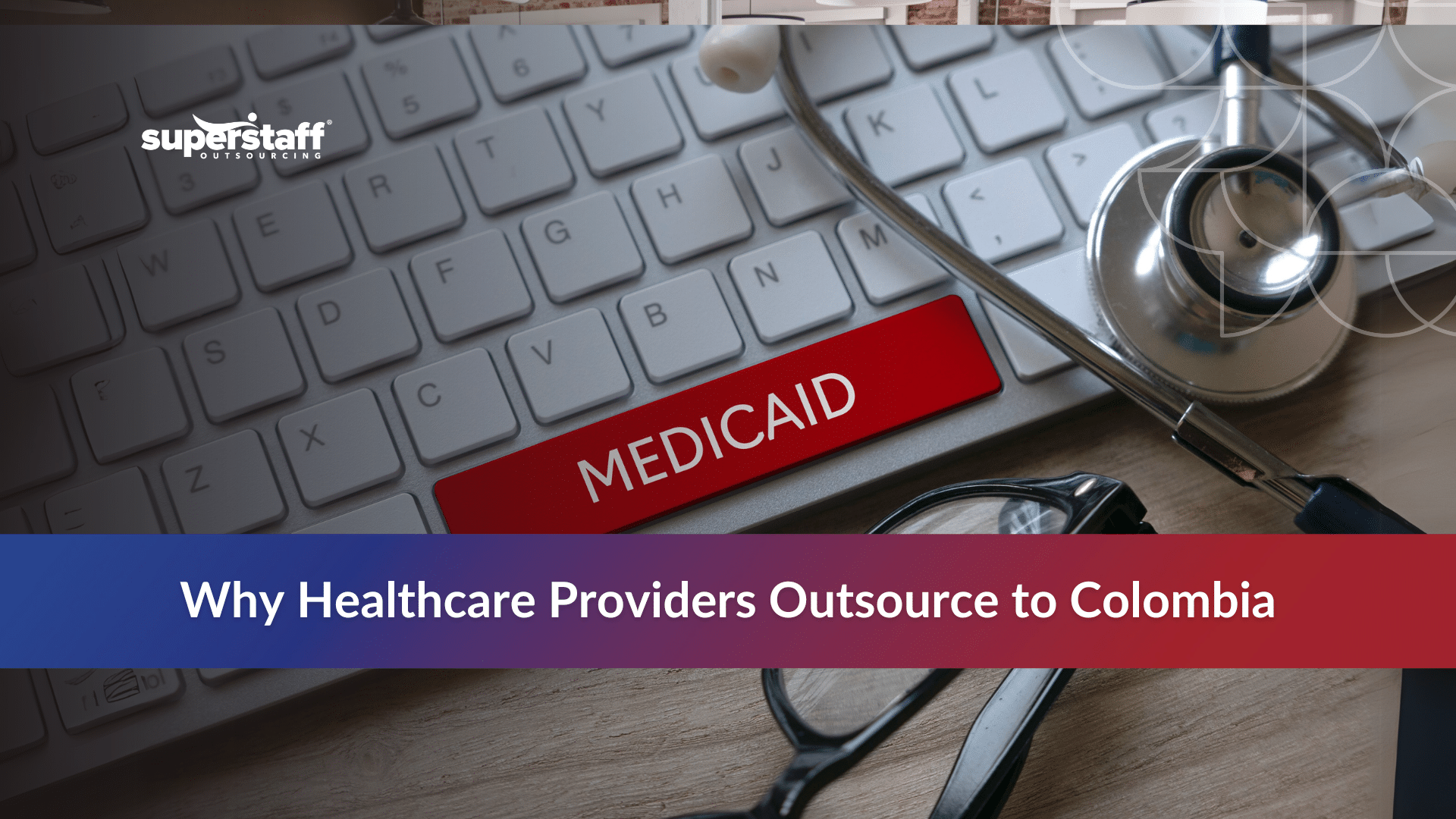
Tariffs may be a political tool, but they’re a logistical nightmare for healthcare providers. When the stakes involve life-saving equipment and critical supplies, even a minor disruption in the supply chain can lead to significant consequences for patients and providers alike. With Trump-era tariffs again dominating the political landscape, healthcare leaders are bracing for impact, especially those relying on medical products sourced from China.
These renewed trade tensions are more than just headlines. They’re triggering higher costs, shipment delays, and bottlenecks across the healthcare ecosystem. For an industry already stretched thin, the pressure to deliver timely, affordable care has never been greater.
This blog explores how offshore teams in healthcare logistics are becoming essential allies in navigating this volatility. From managing supplier relationships to optimizing shipping and fulfillment processes, offshore logistics support offers healthcare organizations the flexibility and cost control to keep operations flowing, even when trade policy doesn’t.
Discover how strategic offshore partnerships can build resilience and keep your healthcare supply chain moving, no matter how rough the road ahead.
Tariff threats are reigniting supply chain instability across the U.S. healthcare sector.
The implementation of tariffs under President Donald Trump has significantly impacted medical supply chains, leading to potential shortages of essential healthcare products. The higher tariffs are also expected to raise healthcare costs, which may be passed on to patients through increased expenses or reduced care quality.
The reemergence of tariffs targeting goods from China has reignited supply chain uncertainty for U.S. healthcare providers. From personal protective equipment (PPE) and hospital beds to durable medical equipment (DME) and pharmaceuticals, many essential healthcare products are becoming more expensive and more challenging to obtain.
Heavy Reliance on Chinese Suppliers
The root of the issue is America’s longstanding dependence on Chinese manufacturing. According to a study by the St. Louis Federal Reserve, China supplies almost 30% of all imported “essential medical equipment” to the United States. Tariffs drive up the cost of these imports, leaving hospitals, clinics, and resellers to absorb the financial hit or pass it on to patients.
This impact stretches far beyond major health systems. Smaller providers, rural hospitals, and private clinics also face steep price hikes, putting them at even greater risk. Meanwhile, patients could experience delays or denials of care due to a lack of available equipment. The result: increased medical equipment import costs in 2025, affecting both sourcing decisions and overall care delivery.
Higher Costs for DME, Hospital Gear, and Pharmaceuticals
Higher costs for core supplies ripple throughout the entire healthcare ecosystem. With inflation, reimbursement doesn’t rise in lockstep, meaning providers must find new efficiencies or risk margin erosion. As prices climb and inventories shrink, healthcare providers scramble for sourcing and operations alternatives.
Healthcare organizations need more than just new suppliers — they need more innovative systems.
Switching suppliers sounds like a straightforward solution, but it requires a complex overhaul of procurement systems, contracts, and vendor relationships. Healthcare organizations can’t afford to simply pivot without a plan.
Shifting suppliers quickly often leads to communication breakdowns, inconsistent product quality, and delivery delays. These transitions are made worse when procurement and logistics teams are already bogged down with manual processes.
As tariffs and inflation squeeze budgets, many organizations face rising labor costs and staff shortages. Teams are stretched thin, and inefficient workflows slow down ordering, tracking, and fulfillment.
That’s why healthcare organizations need alternative sourcing and more agile, well-supported back-end operations to make the transition possible. Outsourcing specialty healthcare services can offer a strategic solution to manage these behind-the-scenes complexities.

Offshore teams support the healthcare supply chain with scalable, cost-effective operations.
Understanding the role of outsourcing in medical procurement is key to overcoming today’s supply chain pressures. Outsourcing key logistics functions allows healthcare organizations to maintain service continuity while lowering operational expenses. Offshore teams can perform many routine but essential tasks that keep supply chains running smoothly.
Coordinating Shipments and Communicating With Vendors
Specialized offshore logistics teams coordinate shipments, communicate with vendors across time zones, and track deliveries in real time. Their support helps avoid delays and ensures orders stay on schedule.
Handling Verification and Documentation
Back-office teams also play a crucial role by handling invoicing, order verification, and the documentation needed for customs clearance and compliance. Though often tedious, these tasks are critical for avoiding bottlenecks and billing issues.
Providing 24/7 Support Coverage
Another advantage? Time zone coverage. Offshore support teams can provide 24/7 coverage to resolve issues as they arise, reducing downtime and improving service levels. This model doesn’t just reduce costs — it also restores continuity during times of policy flux.
Resellers and distributors rely on offshore teams to maintain patient service levels despite tariff disruptions.
For DME resellers, independent clinics, and large hospitals, offshore teams are becoming the unsung heroes behind consistent service delivery. With tariffs creating instability on the supplier side, internal teams need support to stay focused on patient-facing priorities.
Offshore personnel can provide real-time inventory updates to patients and partners, ensuring transparency and trust. They also handle customer inquiries about delays, status updates, and insurance issues, freeing up internal staff for more strategic tasks.
Outsourced billing and claims processing keep revenue flowing. When reimbursement gets delayed due to supply disruptions, offshore teams help bridge the gap with diligent follow-ups and accurate submissions.
The result is not just continuity, but also better patient experience during turbulent times. But not all outsourcing partners are equipped to handle the nuances of healthcare operations.
Specialized BPOs ensure compliance, accuracy, and continuity in medical supply operations.
Healthcare is not just any industry — it comes with strict regulations, sensitive data, and a need for total accuracy. That’s why medical institutions must choose offshore partners who understand the stakes and follow the best practices for healthcare providers adapting to supply chain shifts.
HIPAA compliance is non-negotiable. BPOs working in healthcare must maintain rigorous data security and patient confidentiality standards. In addition, they must be adept at navigating medical reimbursement rules, insurance policies, and supply chain compliance.
Many medical supply chains are international, requiring offshore teams that can communicate across cultures and languages. Multilingual capabilities ensure smooth coordination with vendors, customs officials, and healthcare personnel.
During peak seasons, pandemics, or natural disasters, specialized BPOs can quickly scale operations to meet demand. Their flexibility ensures healthcare organizations are always prepared. In a volatile policy climate, proactive strategies — not reactive scrambling — will determine who thrives.
Why Offshore Teams in Healthcare Logistics Are the Backbone of Supply Chain Resilience
As tariffs threaten the medical supply chain again, offshore teams in healthcare logistics provide a steady, cost-efficient way to maintain service and care delivery. Rather than reacting to crisis after crisis, innovative healthcare organizations are building systems that can weather the storm.
By outsourcing logistics, procurement, and back-office support to SuperStaff, medical providers can regain control, cut costs, and stay focused on what matters most: delivering care.
Looking to stabilize your medical supply chain? Learn how offshore teams can keep your operations — and care — moving forward, no matter the policy shifts.






